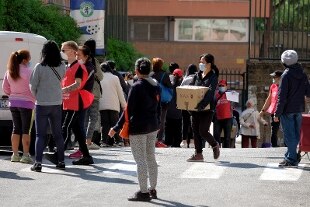- One million new poor in Italy as a result of the coronavirus crisis, Coldiretti estimates
- Ministry of Labor: almost two million Italians in smart working
- Coronavirus, the alarm of Caritas: the new poor increase
Share
02 May 2020 The new poor have doubled. A monitoring of 101 diocesan centers of Caritas Italiana certifies this, according to which there is a "doubling of the people who for the first time turn to the listening centers and services of the diocesan Caritas compared to the pre-emergency period". In detail, 38,580 are the 'new poor'."The demand for basic necessities, food, food and meals at home, solidarity emporiums, canteens, clothing is growing, but also the request for financial aid for the payment of bills, rents and expenses for the management of the house. at the same time, - explains a note from Caritas - the need for listening, psychological support, companionship and guidance for bureaucratic practices linked to support and work measures is increasing ".
Caritas Italiana also reports "a comforting figure: the involvement of the community and the solidarity activation in 76.2% of the Caritas monitored involved public bodies, private or third sector bodies, parishes, voluntary groups, individuals. And if the Pope has 100 thousand euros donated for a first significant aid in this phase of emergency and the CEI has made available a contribution of 10 million euros from the eight per thousand funds, the Caritas' Coronavirus emergency campaign: the concreteness of charity has collected so far more € 1.9 million from 3,760 bidders. "
In the face of changing needs and requests, services and interventions have also changed or adapted, in particular: listening and telephone support services with 22,700 contacts recorded or also in presence in hospitals and in the Rsa; the supply of takeaway meals and home deliveries to more than 56,500 people; the supply of personal protective equipment and sanitizers to approximately 290,000 people; support activities for nomads, carousels and circus performers forced to settle; the purchase of medicines and health products; the remodeling of services for the homeless; psychological support services; family aid initiatives for smart working and distance learning; interventions in support of small businesses; accompaniment to the experience of mourning.
Coronavirus: Caritas, volunteers increased in 60% facilities
Survey confirms that the new poor have doubled (ANSA) - ROME, MAY 2 - Caritas Italiana, since the first days of the Covid-19 emergency, has intensified contact and coordination of all the 218 diocesan Caritas in Italy, playing a role of connection, information, animation and consultancy. This framework includes a first national survey conducted from 9 to 24 April to verify how the needs, weaknesses and requests intercepted in the Caritas listening and / or service centers have changed. As anticipated in recent days, "the doubling of people who for the first time turn to the listening centers and services of the diocesan Caritas compared to the pre-emergency period" is confirmed.
The demand for basic necessities, food, food and meals at home, solidarity emporiums, canteens, clothing is growing, but also the request for economic aid for the payment of bills, rents and expenses for the management of the house. At the same time, the need for listening, psychological support, companionship and orientation for bureaucratic practices related to support and work measures increases.
"A comforting fact is the involvement of the community and the solidarity activation which in 76.2% of the Caritas monitored involved public bodies, private bodies or third sector, parishes, voluntary groups, individuals", underlines Caritas speaking of "a flourish of initiatives perceived also at national level ". The Caritas "Coronavirus emergency: the concreteness of charity" campaign has so far raised more than € 1.9 million from 3,760 bidders. In addition to donations from individuals, there are those of companies, businesses, communities, parishes and other national Caritas.
The monitoring carried out confirms that in 59.4% of Caritas young volunteers, under 34, engaged in activities and services, have increased, which have made it possible to cope with the drop in the over 65 who remained inactive for precautionary reasons.

